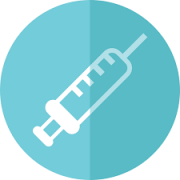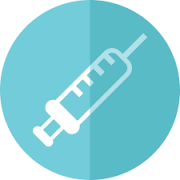Medical Services
24 Hour Blood Pressure Monitoring
24 Hour Blood Pressure Monitoring
The purpose of our 24-hour blood pressure monitoring is to keep a close watch on your blood pressure as you go about your daily activities.
We achieve this through the help of a small digital blood pressure machine that is connected to a belt around your body, which is attached to a cuff around the upper part of your arm.
The need to monitor your blood pressure is to check for hypertension, and to also have an idea of what your blood pressure is like throughout the night and day.
We may require a patient to be placed under 24-hour blood pressure monitoring for the following reasons;
- To know if your blood pressure stays high at night. If we discover that it is high at night, then we may have to change, adjust, or review your medication.
- To monitor how well your medicines are working and to ascertain if your blood pressure is well controlled both during the day and at night.
- To know if your blood pressure readings in the clinic differ from what they are at home or away from the clinic.
These are some of the reasons why we may want to put our patients under 24-hour blood pressure monitoring.
For patients with high BP; if you would like to have good control and monitoring of your blood pressure, our practice is the right place to be. We do not take the well-being of our patients lightly, as we understand that medical issues relating to blood pressure, should be well managed and monitored.
How does our 24-Hour Blood Pressure Monitoring work?
Our 24-hour blood pressure monitoring works in the same way as going to the clinic to have your BP checked, although for the monitoring, a digital device that measures your blood pressure throughout the day is worn on your belt or waist, while the cuff is connected to your upper arm. This digital device takes your blood pressure reading at regular intervals throughout the day; normally every 30 minutes during the day and 60 minutes at night.
How do I prepare for 24-Hour Blood Pressure Monitoring?
This is a question that most of our patients ask; the answer here is that you do not need to do anything to prepare for your 24-hour blood pressure monitoring. However, it is good to wear loose-fitting clothing to your appointment, so that we can fit the blood pressure monitor properly.
We recommend that our patients should go about their regular daily routine the period of 24hr monitoring.
After the 24 hours, we will remove the device and then access the readings to analyze what it implies and make necessary recommendations to our patients. You can always count on our expertise to deliver the best medical services to our clients, at all times.
24 Hour ECG Holter Monitoring
How does the 24-Hour ECG monitoring work?
The Holter Monitor is a portable ambulatory, miniature ECG machine that is capable of providing the following information;
- It captures and monitors the heart rhythm over a 24 hour period. This is undertaken during normal activities and when any special event, which is triggered by the patient, occurs.
- It helps to correlate any form of chest pain and palpitations the patient may experience in relation to the heart’s electrical activity at a particular point in time.
- It helps to show how well anti-arrhythmia medicines are working.
- It records any kind of abnormal heart rhythms that may occur by providing information about the extent of arrhythmia; what might trigger it, and how long it may last.
We encourage our patients who are undergoing Holter Monitoring to observe the following useful tips to ensure accurate recording;
- For people with hairy chest, the part where the electrodes will be placed will need to be shaved.
- The ECG wire, electrodes, or monitor needs to be kept dry.
- Try as much as possible to sleep on their back with the recorder well positioned at their side so that the electrodes do not pull off.
- The wires and electrodes should be properly attached throughout the entire recording.
- Avoid using metal detectors, electric blankets, magnets, and standing in high voltage areas such as amongst power lines, as signals from these devices can influence the recording.
Please make an appointment with your GP to discuss possible ECG monitoring and if you have any cardiac concerns.
Iron Infusions
Iron Infusions
Why is Iron important?
Our bodies need iron. Iron is used to make haemoglobin – the part of our red blood cells that carries oxygen around our body. It is also important for muscle strength, energy and good mental function. If your iron levels are low this may make you feel tired and not able to do normal daily activities. As the amount of iron in the body falls even lower, the haemoglobin level drops below normal. This is known as iron deficiency anaemia.
Why might I need an Iron Infusion?
The most common way to treat iron deficiency is to take iron by mouth as a tablet or liquid. This works well for most people and is usually tried first. Some people may need iron to be given straight into the body through a vein. This is called an Intravenous (IV) iron infusion. Sometimes 2 iron infusions (given at least 1 week apart) are needed to fully top up iron stores. The infusion is made up of iron, not blood. IV iron might be needed if you:
- Are not able to take iron tablets / liquid
- Are not responding to iron tablets / liquid or not absorbing them
- Need to get your iron levels up quickly (eg. before major surgery, late in pregnancy or to avoid blood transfusion)
- If you have chronic kidney disease or chronic heart failure Your doctor should explain why you need IV iron and the other options
How do I make an appointment for an Iron Infusion?
You will first need to make a standard consultation appointment with your GP to discuss your current health, medical history, review of medications and any prior treatment if any. You will also need to have a blood test to determine your current iron levels and your GP will then discuss the next steps. If an Iron Infusion will be beneficial to you, and treatment is deemed appropriate by your GP, an appointment will be scheduled.
Travel Medicine
Travel Medicine Advice for Australians Travelling Overseas
Australians travelling overseas, especially to developing countries, need to be vaccinated against a range of diseases. Illnesses may be caused by contaminated food or water, poor hygiene or infected insects. This is why we provide certain Australian travel medicine advice regarding a number of the common illnesses that you may encounter on your trips.
Things to remember while planning a trip overseas:
- Ask your doctor if you need to be vaccinated
- Make an appointment to discuss your travel plans several week before you leave
- Most illness can be prevented by vaccinations and a little caution.
- Vaccination for specific diseases.
Hepatitis A
- This is the most common vaccine-preventable disease in travelers.
- It is spread by contaminated food or water.
- Symptoms include fever, lack of energy and jaundice.
- Vaccination is safe and extremely effective.
Hepatitis B
- This is spread by body fluid
- Symptoms include fever, lack of energy (malaise) and jaundice (yellow skin colour).
- Around half of all cases worldwide result in death.
- Vaccination is safe and extremely effective.
Typhoid
- This is common in developing countries.
- Symptoms include fever, weakness, headache and sometimes a rash.
- Vaccinations must be completed at least one week before travelling.
Rabies
- This is common to North, Central and South America, Europe, Africa and Asia.
- The cause is a virus passed on by a bite or scratch from an infected dog or any mammal that carries the virus.
- Symptoms include headache and fever, then convulsions and death.
- A three-dose vaccination is given over 3–4 weeks prior to travel.
- All animal bites and scratches should be immediately and thoroughly washed with soap and water for at least 10 minutes.
- Treatment after a bite from a possibly rabid animal involves a course of five vaccines and, if previously unvaccinated, an injection of immunoglobulin.
Meningococcal Meningitis
- This is common in Africa.
- The cause is a virus spread by aerosol droplets.
- Symptoms include headache, fever, confusion and neurological damage.
- Vaccination is a legal requirement for some countries.
Japanese Encephalitis
- Common to China, Korea, the Indian subcontinent and South East Asia.
- The cause is a virus spread by infected mosquitoes.
- Symptoms include headache, fever, confusion and neurological damage.
- Treatment can only ease the symptoms.
- Three doses of vaccine are required well before you travel.
Yellow Fever
- This is present in tropical South America and sub-Saharan Africa.
- The cause is a virus spread by infected mosquitoes.
- Symptoms include fever, headache, bloody vomiting, jaundice and death.
- The vaccination gives immunity for around 10 years.
- Vaccination is a legal requirement for some countries and certification can only be given by an authorised travel health clinic.
Ways to protect yourself from illness caused by contaminated food and water, or from mosquito or animal bites:
- Don’t drink tap water (or have ice in drinks)
- Don’t buy food from vendors on the street
- Wear long sleeved shirts and long pants
- Wear insect repellent
- Stay away from animals
Allied Health Speacialist
You may now book appointments online 7 days a week, 24 hours a day with the doctor of your choice, at the time of your choice from the comfort of your own home. Note this service is only available to existing patients of the practice, and is provided free of charge.

Marina Payne
Dietitian
If you’re looking for a podiatrist you can trust in Camberwell, Dr. Peter Moate is available to provide you with foot and lower leg care as soon as you need it, with some of the most dependable podiatry services available anywhere.

Peter Moate
Podiatrist
If you’re looking for a podiatrist you can trust in Camberwell, Dr. Peter Moate is available to provide you with foot and lower leg care as soon as you need it, with some of the most dependable podiatry services available anywhere.
Physiotherapy
David Thwaites
Looking for complete sports care physiotherapy to help you stay in great shape? David Thwaites can give you everything you need as an experienced physiotherapist and pilates instructor. Through these services, you can manage musculoskeletal pain and other types of injuries that can assist with rehabilitation.
Learn more
Book now
New View Psychology
For more information, contact the clinic on 03 9882 8184
Australian Hearing
For more information, contact the clinic on 03 9882 8184
Onsite Pathology by Melbourne Pathology
Blood Tests Available
Monday to Friday (8:00am to 4:30pm)
Saturdays 8:00am – 12:00pm
Blood Tests:
- Cholesterol
- Blood Sugars (Diabetes)
- General Health Checks
- INR (Internal Normalised Ratio) for Warfarin
- ECG’s
- 24 hour holter monitors
Circulation Testing
Do you feel your circulation is not what it should be?
Have you experienced any of the symptoms below?
Signs Of Poor Circulation
There are a several signs to look out for which can suggest that you may have poor circulation. These include:
- Cold feet and toes – not just in wintertime
- Cold hands and fingers
- Feeling numb in certain parts of the body, especially the extremities
- Feeling tired or having a lack of energy for much of the time
- Some hair loss can be because of bad blood flow
- Having regular dizzy spells
- If your skin gets dry even though you drink plenty of water
- Swelling and water retention, especially in the feet
- Lumps in blood vessels and varicose veins
- Headaches
- Cramps and pins and needles
- Blotches and blemishes in the skin
Some people will have none of these signs but may still be in the early stages of circulation changes.
At Family Doctor we offer a simple test to check for circulation problems.
This called Ankle-Brachial Index test (ABI). This test is done in the clinic to evaluate circulation in the legs. It begins by the nurse using specialist equipment to take blood pressures in the arms and at the ankles at the same time which then gives us a report of the blood flow in your legs. The exam takes about 10 minutes to perform and you will be asked to rest flat for this procedure.
The nurse will look at the skin on your legs and feet for colour changes, check skin temperature and the pulses in your legs and feet .
Your doctor will review your medical record to assess additional risk factors you may have for developing poor circulation, discuss the results of your ABI and if necessary order blood tests.
Poor circulation can have many unhappy repercussions for your body, especially your heart, brain and legs if left unchecked. If identified, early prevention and improvement is possible.
Scarless Mole Removal
We are an accredited Yellow Fever vaccine provider. You will need to see our accredited doctor Dr Karen Langston for administration of this vaccine. The yellow fever vaccine will attract an out of pocket cost of $105 to cover the cost of the vaccine.
Vaccinations
We are an accredited Yellow Fever vaccine provider. You will need to see our accredited doctor Dr Karen Langston for administration of this vaccine. The yellow fever vaccine will attract an out of pocket cost of $105 to cover the cost of the vaccine.
Doctors At This Practice Offering This Service

Covid Vaccine 5th Dose

Flu Vac - Over 65 Gov Funded

Dr Angela Xu

Dr Barbara Iakovidis

Podiatrist - Peter Moate

Dr Sana Al-Rubaye

Dr Bozena Falkowski

Dr Kathryn Henry

Dr Julie A Doswell

Dr Les Jenshel

Dr Lesley Hoy

Dr Rebecca Leong

Flu Vac - Under 65 - Private

Dr Coniela Sgroi

Dr Stacey Harris

Dr Richard Hince

Dr Karen Tong

